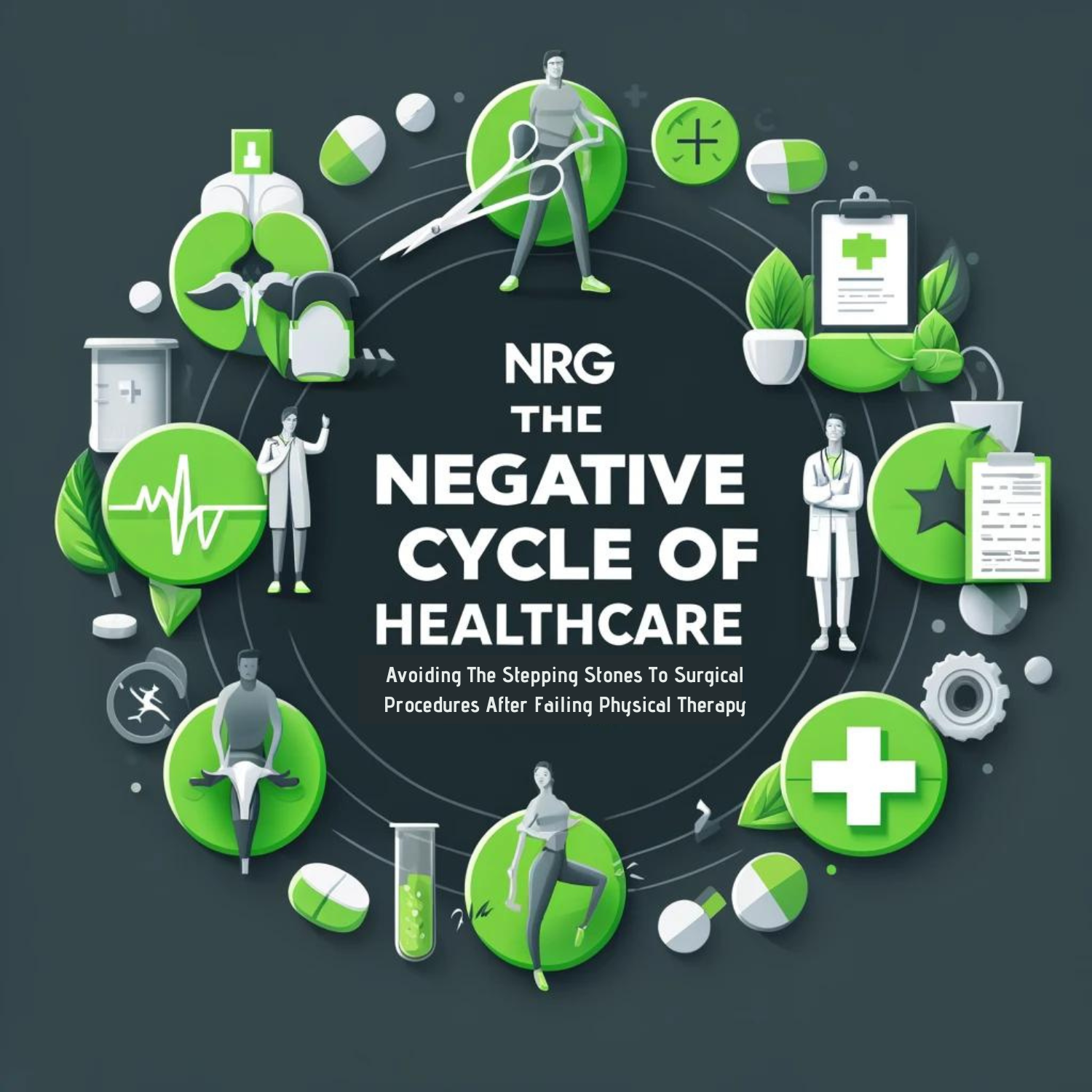The Negative Cycle of Healthcare

Healthcare is messed up. Healthcare may actually be the biggest racket on earth. It costs too much, is difficult to access, and outside of life saving procedures, is pretty underwhelming. In terms of quality patient care, attention to detail, and doing things in an order that makes any kind of sense it is sorely lacking. This problem exists nationwide and is systemic in the healthcare industry. I will be speaking from the physical therapists perspective since that’s my zone. And though it seems like a strange place to make claims from…it may actually be the best.
The Benefit of the DPT Perspective
Physical therapy is unique in that we see most of the flaws in healthcare before, during, and after they happen. Physical Therapists see people pre-op and post-op. We see people before they go to primary care and get referrals from primary care. DPT’s see people before and after seeing a “specialist.” And we see people before advanced imaging, and in most cases, after advanced imaging which is the most backwards, costly, and senseless way to waste human beings hard earned cash and time.
I will inevitably take jabs at primary care, specialties, other facets of healthcare, and I will be especially be taking jabs at physical therapist. But please know this: All healthcare providers want what is best for the consumer. Most of them do, anyway. Most providers got into the biz because they “want to help people.” Money was also a factor. As a therapist money was definitely a factor for me. That didn’t turn out so well but I love what I do nonetheless! Im not sure where the national averages for a DPT salary come from but it’s certainly not Indianapolis. But regardless of our reasons for doing what we do, the quality of which we do our thing boils down to a few things: Knowledge and skills.
Knowledge and Skills
We are all limited by our scope of knowledge and the skills we use to treat. Even the most knowledgeable still have limitations somewhere. Some providers have a very narrow scope of knowledge, and a skill set to follow, which ultimately limits them from seeing the bigger picture and solving complex problems. Other providers are a wealth of knowledge and skills far beyond their speciality and this likely makes them a better provider. In short, knowledge without skills is dead and vice versa. Even so, insurance companies and what insurance companies will pay for dictate the services provided regardless of knowledge and skills.
Insurance Shminsurance…
A provider is literally only as valuable as what insurance pays according to insurance companies. Provider “A” is terrible and Provider “B” is excellent. Insurance pays them both the same. That makes zero sense. And it’s our fault. We, the providers, allowed ourselves to be pigeon-holed into the current model and now it appears there is no escape. We lobby for insurances to cover more services and in doing so we give away control of our values, worth, and ability to control patient care. How silly right? We complain about insurance not covering a service. Then it finally gets reimbursed. Once that service is covered…back to complaining because they reimburse too low! The truth is that uncovered services are the only services we can provide and control the cost, time spent, and value provided, unless of course you go all cash based, out of network, of a hybrid that takes insurances but sells non covered services. In the end, insurance reimbursement becomes so low that clinics have to see high volumes of patients just to keep the doors open and pay the bills. So what are the options for the provider?
- Get through 50 patients as quickly as possible, or…
- Never see their family again because they are stuck at the office indefininantly.
Its an obvious choice… or is it? I posted a question on Facebook asking “what is your least favorite thing about healthcare?” The first answer I got I think is the most common. She said “I feel like they don’t even listen to me. I feel like i’m at the BMV and i’m just the next number in line. May sound funny on first read but guess what?!? It’s true. And everyone hates the BMV. Even the BMV.
What the heck are you doing?
Are you ok providing or receiving cut rate care just to get through the day? Are you aware you could be doing better, or receiving better, but don’t take the time do provide or receive better? Providers– Did you send a patient for an MRI because you don’t know your stuff, wont take the time to figure it out, and thats just what the patient wanted? Get real. Patients– did you ask for an MRI for peace of mind? You wont get peace of mind. Get to another professional with more knowledge and skills rather than wasting another patients time and money on a worthless image of their insides. If a patient comes in with pain and comes out with a scheduled MRI—something is bad wrong with how that patient visit just went down. Patients appreciate 5 minutes of active listening, getting them to someone you know can help, and no treatment way more than 5 minutes of waiting for them to stop talking so you can prescribe the same thing no matter what they say.
Consider this:
Primary care: Did that MRI change what you prescribed or your next referral? Probably not. Did that medication solve their problem or cover it up? Probably covered it up like a nice warm blanket.
Non-surgical Ortho: Did that MRI change your prescription or your next referral? Probably not. Did you provide a solution for the patient to attack the root cause or only manage symptoms? In my experience… symptom management.
**Physical Therapist: Did the MRI change your treatment plan for the patient? It better not…because you better not be treating an image. Don’t even get me started… I could literally go on for days about all the flaws with advanced imaging for diagnostic purposes. Maybe I will in another post. Did your treatments address the painful site or address the body as a unit? Probably the painful site. Get that pain gone and discharge, right? I remember the days thinking, “If I can discharge 4 people this week, then next week I don’t have to see 25 patients a day.” 15 minutes with a licensed professional and the rest with someone who has not even graduated yet? What a waste of the patients time and money.
Surgeon: Did the MRI accelerate a surgical timeline without exhausting high quality conservative options? I said high quality. Not just conservative. Did the medication you provided serve as a diagnostic tool for tissue disruption or to allow your patient to function until you can perform a surgical procedure?
What About The Research?
Researchers want their outcomes. It is difficult to read even the best research and not think about all the bias at play. Whoever is paying for the research wants a certain outcome and therefor those conducting the research want that outcome. Systematic reviews and double blinded randomized control trials are still full of bias and limited to specific pain locations, symptoms, and treatments. Most research seeks to find that validity of certain treatments on certain symptoms. This is especially true in medicine. Research shows thera-band external rotation is the best thing for activating the infraspinatus. Who cares what your fwhubaghad is doing if you can’t raise your arm over your head to change a lightbulb? Research shows a lot of things that are super specific treatments, for super specific problems, in super specific locations. In reality, pain is super complex, requires less specificity of treatments, requires looking somewhere else besides the location of pain, and addressing multiple locations instead of a specific one.
Research lowers the quality of care (especially in rehab) by giving narrow minded providers a false sense of security because they can provide treatment “X” for symptom “A” and sit comfortably because that is the best treatment research says for that specific symptom. And it is too bad there is no set protocol for when to give an MRI. Thats a “treatment” that gets prescribed a lot even though it does not help the patient at all. Research has shown that people who receive an MRI early in their course of care spend more money and have worse outcomes. That is the most useful information I have seen in a while and is largely ignored in the medical community. The second most ignored phenomenon is that of providing symptom management and calling it “healthcare.”
Broaden your scope
There are so many things to be inconsiderate of and we are doing a bang up job. Better healthcare starts with better listening, better diagnostics (which doesn’t include imaging), and better treatment of systems and causes rather than treatment at specific locations and symptoms. This applies across the board to all medical professionals and requires everyone to display the highest level of knowledge and skills possible across multiple body systems. Pain and dysfunction in the human body requires active, global solutions. Stop using passive and local treatments.
No Offense, but…
If you are a provider reading this don’t take it personally. Im not talking to you. Im talking to the system. If it steps on your toes…maybe I am talking to you!! Wake up. Maybe you have become part of, or a victim of, the system and have some self reflection, advanced learning, and personal development to do. It’s going to take more than one provider to make this change. We are all going to have band together with a similar purpose to make change. If we talk about it enough and be about it even more… we WILL create that change. If you want to play a role in facilitating that change I would love to hear from you!
Doubling Back:
Im going to double back on that question I asked and the answer I received. Remember that one? A healthcare consumer stated she feels like she is just next in line at the BMV when she goes for a primary care visit. Take a look at this little video where I will plainly and bluntly walk through the downstream effects of a BMV style primary care visit. No single person is to blame in the video. Instead the blame is shared equally by all parts. But if I had to choose one place to put all the blame…I am going to blame the physical therapist all day long.








Recent Comments